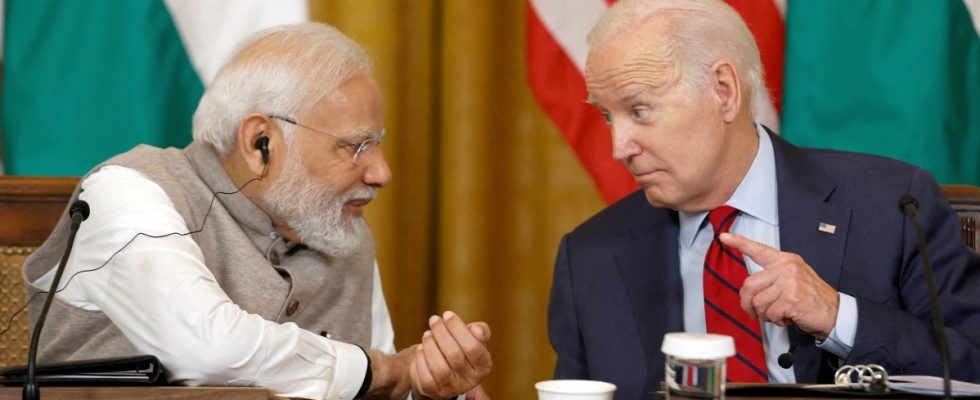Former US President Barack Obama’s views are still being heard around the world. India is no exception, as Obama apparently struck a chord in a CNN interview with Christiane Amanpour a few days ago. Among other topics, it was about the visit of the Indian Prime Minister to Washington, and Obama indirectly gave his democratic successor Joe Biden a recommendation: If he spoke to Narenda Modi himself, Obama said, he would still protect the Muslim minority in India for “notable”. And further: If it is not possible to protect minorities, “there is a high probability that India will start to tear apart at some point,” Obama warned.
A minister in Delhi says the ex-president cannot be trusted
Those who wanted could read criticism of Modi’s divisive national-religious politics, which favors Hindus. Muslims form a large minority there – 170 million people. Complaints about discrimination and persecution of religious minorities are growing. It is not known whether the incumbent US administration secretly welcomed ex-President Obama’s words, nor is it known how clearly Biden addressed India’s Muslims in talks with Modi. One thing is certain: Biden primarily wanted to use the visit to tie India more closely to the United States. There were important deals in the defense sector and for the production of semiconductors. Strategic goals are paramount because both countries want to curb Beijing’s growing power.
Nonetheless, India’s internal cohesion is such an important issue that Obama’s comments provoked some violent reactions, especially in the ruling Bharatiya Janata Party (BJP) camp. No sooner had Modi returned home than his Treasury Secretary, Nirmala Sitharaman, launched a counterattack against Obama. “I was shocked that a former US President spoke about Indian Muslims,” she said. She sees this as a “specific attempt to spoil the climate in this country”.
Without the protection of minorities, India will be torn apart, says ex-President Barack Obama. This does not go down well with the government in Delhi.
(Photo: Thanassis Stavrakis/AP)
She then explained that under Obama a number of Muslim-dominated countries, such as Syria, had been bombed. She wondered how one could “trust allegations by a former president” who was responsible for something like this. There was initially no reaction from the US government to the tirades, which apparently alluded to Washington’s fight against terrorism. Some saw it as an attempt to distract attention from India’s problems and to discredit Obama as a violent criminal.
discrimination? Intolerance? Doesn’t exist in his country, says the guest
It fits that Sitharaman complained that people were now discussing things that didn’t even exist. In doing so, she was faithfully following Prime Minister Modi, who had set the line himself at the memorable press conference in Washington. It was the first and only opportunity for journalists to ask questions Modi had allowed in nine years. A US journalist wanted to know from the state guest what he was doing to protect the Muslim minority in India. The prime minister avoided a direct answer, instead using punched-out sentences like: “Democracy is in our DNA.” discrimination? Intolerance? According to Modi, none of this exists in his country.
The Modi-loyal media, which dominate the public, celebrated the visit largely uncritically, cultivating a cult of personality. But a few journalists then dared to sound out the phrases of their government. Tavleen Singh, for example, commented on the Modi government’s “questionable human rights record”. Indian Express.
Modi’s confessions would not have prevented Indian Muslims from being brutally attacked. The columnist mentions the targeted killing of Muslims by Hindu extremists who act as protectors of sacred cows. She also cites cases in which only Muslim houses were flattened after protests, but the Hindus were spared. Such “bulldozer justice” is an immediate threat to India’s rule of law.
Modi must do much more “than say nice things about democracy,” Singh demands, speaking from the heart of many critics who see Indian pluralism in danger. Above all, the prime minister must allow dissent and freedom of expression, because they are the lifeblood of true democracies.

